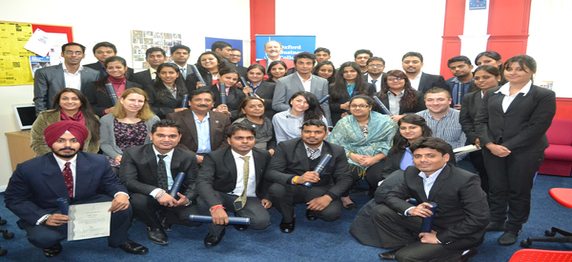Six Tips for Effective Management Success
February 15, 2021Effective management, it is said, is all about successfully achieving the long and short-term goals while guiding everyone towards the vision of the organization. This, however, is easier said than done. As a student of management pursuing your MBA or PGDM course that would one day make you a manager – know that having a management system that fulfills your goals and at the same time maintains the balance to keep the employees happy can be difficult. Organizations may adopt different styles of management, but it will all come down to the fact of how effective these styles are turning out to be. These systems will need proper planning and a framework that keeps the flow of work in check.
This article discusses how you can incorporate an effective management system to maximize performance and productivity. At the end of it, you will discover how most of these lessons are being taught at top B-schools like Asian Business School (ABS), Noida through well-structured academic and skill-development programmes as part of their core course curriculum.
The 6 Effective Management Tips for Your Success
As a manager, if you are ever in a fix about how to come up with an effective management system, then here are a few tips that will be helpful for you.
- Communicate Effectively
The most important key to effective management is to be able to communicate clearly, which is only possible if you listen. Remember, communication is a two-way street, and the more you listen and value others’ opinions, they’ll do the same with you.
When there is a clear flow of communication within the organization, you will be able to build the bridge of trust with your employees. It will not only boost their confidence, but they will also able to contribute to collective goals.
How to successfully achieve it:
- Promote active listening.
- Never be biased about opinions.
- Understand everyone’s perspective.
- Always ask your employees about the problems that they are facing.
- Time Management
Essentially, time management is much more than flexible schedules and giving time to complete checklists. It is also about providing adequate time to solve problems that your employees might be facing and provide them the best guidance for career growth.
Moreover, at times, projects will not come with the luxury of time. In situations like that, you must make sure to bring the team for sessions where you can strategize on completing the project with the time in hand. This will not only help you to bond the team well, but it will also allow you to use the time efficiently and manage it well.
How to successfully achieve it:
- Minimize the habit of multitasking.
- Never procrastinate.
- Prioritize the tasks in hand.
- Plan the day in advance.
- Delegating
Delegating tasks is all about dividing the work into separate sections in the team. It will also become an opportunity for you to help your team members to learn, develop, and grow. But, managing the team with the right task is essential. Remember, every employee has their weaknesses and strengths, and assigning the right job will become quite crucial.
By understanding the abilities of each employee and their goals, you may assign tasks that will eventually help them grow professionally. It will be all about taking the best out of them while continuously building the team towards perfection.
How to successfully achieve it:
- Always provide necessary instructions.
- Trust your team when you delegate tasks.
- Use feedback to improve your delegation.
- Stay committed to the cause and never let interruptions break the flow of work.
- Be clear about your goals and your visions.
- Problem Solving
In the long run, you and your team are inevitably going to face problems and challenges. When there will be understanding in the group, you will be able to analyze the issues and work towards practical solutions swiftly. And with effective management in place, your day-to-day processes will require solving problems independently without any hiccups.
Generally speaking, problem-solving starts by building trust and setting realistic goals that your team can achieve. And when there is trust within the group, it will provide an opportunity to coach them and prepares them to take the lead on future problems.
How to successfully achieve it:
- Understand the core of the problem.
- Ask the right questions about the problem and do not deviate.
- Devise the necessary solutions that your team can come up with.
- Evaluate the best solutions.
- Stay open-minded and select the solutions that will be effective.
- Building Transparency
Remember, management is only successful and effective when there is transparency within the organization. And as a manager, you will need to be more open and honest with your team and employees.
When you will be able to pass on every crucial information among the team, you will be more likely to gain the trust and loyalty of your employees. So, be more mindful and always choose the best time to share a piece of news because it is important not to break your employees’ focus. You must also try to withhold information at the time when you are not at the liberty to. You must learn to be more observant about sharing so that the foundation of trust can be built without breaking any rules.
How to successfully achieve it:
- Involve employees in decision making.
- Always share results with your team.
- Prioritize communication.
- Hold a session where you can share every possible important detail of the organization.
- Culture of Feedback
Effective implementation of feedback over a period of time has not only proven to be impactful for organizations, but it has also boosted their productivity levels. According to a recent study, 98 percent of employees fail to engage when there is little or no feedback from managers. And it is true. Hence, if you are able to provide the necessary feedback that your employees need, they will be able to work according to their strengths and weaknesses. In turn, this will make them better in what they do.
The culture of feedback will turn out to be vital not only for you and your organization but also for the employees. This is because, it enhances productivity, boosts morale, and makes your management system durable.
How to successfully achieve it –
- Be very specific about what feedback you want to give.
- Feedback should be on time and should not be delayed.
- Always go for constructive feedback.
- Focus more on the efforts of your employees.
- It should always be a two-way affair. So, when giving feedback, you must ask for their opinions as well.
Summing it Up
In conclusion, it can be said that having an effective management system within the organization needs a proper structure and time to run. This cannot be incorporated within a day or a month. And, successful managers generally manage people by guiding them to the right path and by leading the team towards greater success. It has been found that with an effective management system in place, things get easier and employees are more driven towards the vision of the organization because they know that this is going to benefit them in the future driving employee engagement.
So it is that, at Asian Business School (ABS), there is a lot of stress on developing soft skills as a part of the core course structure. There are various facilities initiated by the college to delve upon such skills. In fact, it flaunts a dedicated Centre of Skill Development (CSD) to ensure that their students are able to hone-up their skillsets to match the growing expectations of the business world. The sole objective of ABS has been creating knowledge, influencing management practices and global integration. Every ABS student is provided with highly professional environment of learning from the very first day. The institute places great emphasis on inculcating corporate values and skills required for complex decision-making, besides developing superior expertise on functional domains and garnering business knowledge.
Hence, while you are at your respective colleges and institutes, diligently learn to set goals, become a great manager, and create an environment where effective management can bear fruit!








